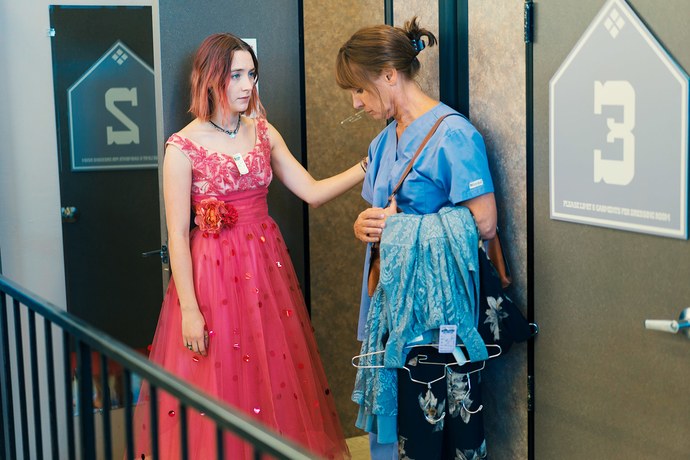There is a moment about two-thirds of the way through Lady Bird–Greta Gerwig’s first film as a writer/director–where Christine “Lady Bird” McPherson (Saoirse Ronan, still one of the best young actresses around) is having a conversation with one of the nuns at the Catholic high school from which she will soon graduate. Told that her writing reflects a deep love of Sacramento, the town she has spent her entire life in and which she longs to escape, she brushes the compliment off by saying she just pays attention; she is answered “aren’t they the same thing, love and attention?” The moment stands out in a film made up of shrewdly observed moments because it so clearly articulates the movie’s beating heart, and that of many a bildungsroman (bildungsfilm?) like it: to what do we choose to devote our energy and attention and how do we deal with the attention focused on us?
At the center of this film that question relates to the often difficult relationship between Lady Bird and her mother, Marion. Played by Laurie Metcalf in an Oscar-worthy performance, Marion is a forceful personality–“scary and warm at the same time,” as Danny (Lucas Hedges), one of Lady Bird’s boyfriends, puts it. Their relationship turns on a dime from shared jokes to a barrage of criticisms and explosions that leave quiet and good-natured husband/father Larry (Tracy Letts) holding the bag between them. But it’s also about other kinds of love and attention. We also watch Lady Bird process two very different romances with the doting theater-geek Danny and the aloof boy-in-the-band Kyle (Timothée Chalamet). We watch her shifting relationship her best friend Julie (Beanie Feldstein, all heart and someone to watch in the future). Most importantly we watch her learn to pay more attention to herself: her needs, her participation with those around her, her own transitioning identity.
The movie is, in this regard, certainly nothing novel. Different versions of this story are as old as stories themselves; they’ve been told many times in many mediums. What makes or breaks them is the feeling they’re able to generate, the love and attention they have for their characters and the place, moment, and culture that surrounds them. In case it wasn’t clear by this point, this film succeeds admirably in that regard. Even its less central characters, like popular girl Jenna (Odeya Rush) or Lady Bird’s apparently adopted older brother Miguel (Jordan Rodrigues) avoid falling into caricature. The dialog is intelligent and clever without crossing the line into artificiality. The details of the design–the posters on Lady Bird’s wall (Sleater-Kinney, etc) or the pattern on the McPherson’s living room couch–quietly add to our understanding of this milieu, its contours, assumptions, and rules. There are moments that slightly break from total realism, of course. A football coach teaching a drama class is played for straight laughs; the opening scene is a dramatic punctuation mark that stretches plausibility a little (although it dovetails with the ending so beautifully, I’m a little loathe to call it out). But even these moments are still in the larger spirit of the people and the world to which they belong.
It’s here that I feel, as a reviewer, I have to confess a certain bias: I’m personally about the same age as the main characters here. The film is set roughly over the course of a year, between fall 2002 and 2003, a period during which I also moved across the country, started college, and began to become conscious of things like the economic recession that adds a pressure point to the McPherson family. It would be easy, then, for a movie like this to simply play into a wave of thirty-something nostalgia–something I was watching for going in–but that fortunately isn’t the case. In fact, that it is a period piece is largely irrelevant; Julie and Lady Bird lie in a car singing along to “Crash Into Me,” but the moment is about bonding over a personal tragedy, not the song itself. It could have been anything and would still read.
A more interesting take, then, is that I cannot at the moment think of a film that focuses on a mother/daughter relationship (or really about a teenage girl at all) that is less melodramatic than this one. The kids in this movie smoke pot and play pranks but are not particularly wild or out of control; sex and depression factor in, but nobody has cancer or sleeps around; romance exists but is hardly the central focus; the conflicts have tremendous personal weight for those involved but are at heart banal. Although perhaps not as technically adventurous as Linklater’s recent Boyhood, there is a similar warmth in tone and the change in perspective feels as fresh and interesting as anything in that film. There is a significance in the fact that this is a film by a woman about a young girl–especially such a record-breaking film in an industry currently being shredded for its underrepresentation of women’s voices–but it succeeds because it’s one of the best, most emotionally accurate films about growing up my generation has yet produced.

One response to “Lady Bird (2017)”
Heartfelt and honest. Nice review.
LikeLike